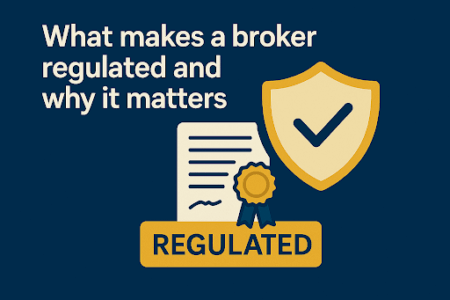28 October 2025
By Roger Kennedy
roger@TheCork.ie

In 2025, markets are volatile – crypto swings 5-10% daily, forex pairs like USD/CHF hit 1-2% moves. Choosing a broker can make or break your trading. Regulated brokers offer safety nets, protecting funds amid scams and market crashes. With 80% of retail traders losing money, regulation reduces risks of fraud. Copy trading, popular with $50 billion in assets in 2024, benefits from regulated oversight. This article explores what defines a regulated broker and why it’s critical for success.
What Makes a Broker Regulated?
So, what regulated broker is? It’s a firm licensed by a financial authority, like the SEC in the US, FCA in the UK, or CySEC in the EU, ensuring compliance with strict rules. These include capital reserves, client fund segregation, and transparent reporting.
Regulators enforce standards. Brokers must maintain $1 million+ in capital, audit trades, and protect client data. They face regular inspections to ensure fairness, unlike unregulated firms.
Regulation varies by market. Forex brokers follow MiFID II in Europe, while crypto brokers may align with FinCEN. This oversight builds trust, critical in volatile markets.
Key Differences and Benefits
Regulated brokers prioritize client safety. They segregate funds, ensuring your $10,000 isn’t used for operations. Unregulated brokers often mix funds, risking losses if they fail. Regulated firms offer insurance – up to $250,000 in the US via SIPC.
Transparency is higher. Regulated brokers disclose fees (0.1-0.5% spreads) and risks, while unregulated ones hide terms, leading to unexpected costs. Fraud risks drop – regulated brokers face penalties for misconduct.
Benefits include dispute resolution. Regulators mediate complaints, unlike unregulated firms where you’re on your own. This protects traders in 2025’s high-stakes markets.
| Aspect | Regulated Broker | Unregulated Broker |
| Fund Safety | Segregated, insured up to $250K | Mixed, no insurance |
| Transparency | Clear fees, audited trades | Hidden costs, no audits |
| Fraud Risk | Low, regulatory oversight | High, no accountability |
| Dispute Resolution | Regulator mediation | No recourse |
How Regulation Enhances Safe Trading
Regulation safeguards funds. In October’s 12% BTC crash, regulated brokers ensured client funds stayed secure, unlike unregulated ones facing insolvency risks. They enforce KYC, reducing fraud.
Risk warnings are mandatory. Regulated brokers disclose that 80% of retail accounts lose money, helping you plan. They limit leverage – 30:1 in the EU – to curb wipeouts, unlike unregulated 100:1 traps.
Copy trading benefits too. Regulated brokers verify pro traders’ records, ensuring you mirror reliable 80%+ win rate strategies. This adds safety, though you must study trades to avoid blind reliance.
Conclusion
Regulated brokers are your shield in 2025’s volatile markets, with oversight ensuring fund safety and transparency. They segregate funds, disclose risks, and limit leverage, unlike unregulated firms where 80% of traders lose money to scams or crashes. Choose brokers with licenses from trusted authorities, cap risk at 1-2%, and use copy trading for vetted pros. Regulation doesn’t guarantee profits but cuts fraud risks. Start small, verify credentials, and trade confidently with a regulated broker.
